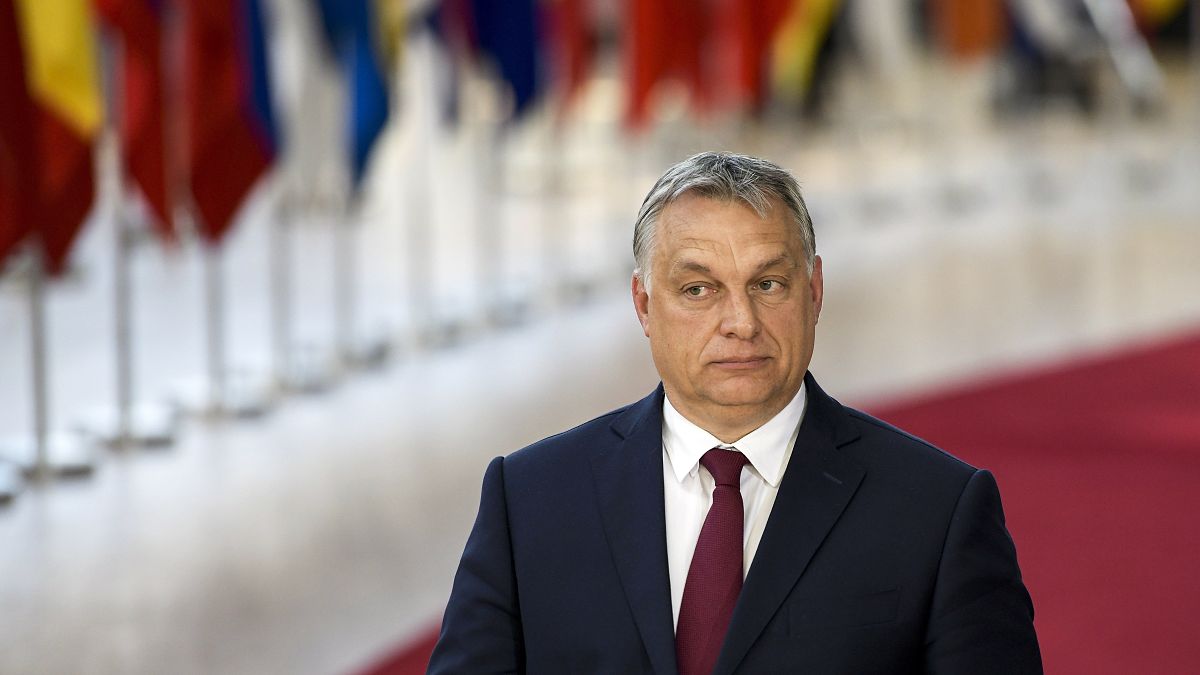In a draft report, Dutch Green MEP Judith Sargentini accused Orbán's government of posing a "systemic threat" to the EU's fundamental principles and compelled her contemporaries to support her recommendation to launch the little-used Article 7.
The European Parliament is Wednesday set to vote on a draft motion urging member states to trigger Article 7 of the EU's treaties against Hungary over the country's human rights record.
Prime Minister of Hungary Viktor Orbán will address MEPs in Strasbourg on Tuesday as Parliment debates the report, which accuses his party of seriously undermining EU values.
If approved, this measure could lead to Budapest having its voting rights suspended, however, all other states have to vote in favour for this to be put in motion.
Dutch Green MEP Judith Sargentini, who produced the draft report, accused Orbán's government of posing a "systemic threat" to the EU's fundamental principles and compelled her contemporaries to support her recommendation to launch the little-used Article 7.
What does the politician accuse Budapest of in the "Sargentini report"?
1) Allegations of abuse to migrants
The Sargentini report cites concerns from UN and Council of Europe Commissioners about increasing allegations claiming the abuse of asylum-seekers and migrants by border authorities in Hungary.
It also highlights more general restrictive border and legislative measures, including access to asylum procedures.
2) Restrictions on freedom of the press
Hungary's current legislative framework does not fully ensure an uncensored and unhindered press, according to Sargentini.
The report says that amendments to a freedom of information law restrict the right to access government information.
It gives the example that after the 2018 elections, in which Orban's Fidesz party was victorious, Hungarian magazine Figyelő published a list of 200 “mercenaries” working for George Soros that wanted to “topple the government”. Among them were members of rights groups and NGOs as well as investigative reporters.
3) Corruption and conflicts of interest
MPs in Hungary should report conflicts of interest as they arise and this should be accompanied by a more robust obligation to submit asset declarations, the report asserts.
It cites an OLAF investigation from 2016 and 2017, which found “serious irregularities” and “conflicts of interest” during its investigation into 35 street-lightning contracts granted to the company at the time controlled by the Hungarian Prime-Minister’s son-in-law.
It also calls for sanctions in the case of inaccurate asset declarations.
4) Inadequate privacy and data protection
The Sargentini report states that the UN Human Rights Committee was concerned that Hungary’s laws on secret surveillance for national security purposes allow for the mass interception of communications.
The MP adds that the country does not adequately safeguard against "arbitrary interference with the right to privacy".
5) 'Stereotypical attitudes' towards women
The report cites April 2018 comments from the UN Human Rights Committee saying that patriarchal stereotyped attitudes are still prevalent in Hungary concerning the position of women in society.
It also underlines discriminatory comments made by political figures against women and the fact that the Hungarian Criminal Code does not fully protect female victims of domestic violence.
6) Concerns over electoral system
The report quotes an Organization for Security and Co-operation in Europe (OSCE) statement on the April 2018 elections, which said access to information as well as the freedoms of the media were restricted.
It added that media coverage of the campaign was extensive, yet highly polarized and lacking critical analysis.
7) Constitutional concerns
The Sargentini report raises concerns about the constitution-making process in Hungary, because of its perceived lack of transparency, "the absence of sincere consultation and the inadequate involvement of civil society".
The Constitution of Hungary has been amended six times since it entered into force in 2012 and the Hungarian government has carried out several national consultations in the last few years including one titled “Let’s stop Brussels” in 2017 and one against the so-called Soros-plan.
The Hungarian government claimed that the EU was exacting revenge on the country using the draft report is to because Budapest was against the bloc's migrant quotas.
Orban dubbed the document a "Soros-report", with one Fidesz member saying it was an attack by Soros' NGOs full of "qualified lies".
